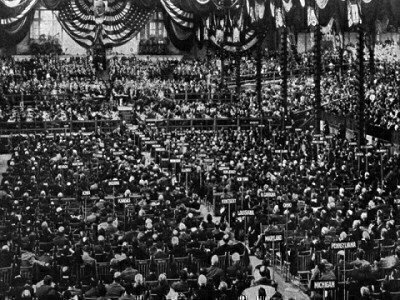With news on Thursday that Philadelphia will host the 2016 Democratic national convention, a quick look at the history of conventions hosted in Philly shows a trend that slightly favors that political party in an upcoming convention.

Philadelphia has hosted eight major party conventions since 1832, and it is the second most-popular spot for national political conventions next to Chicago. (Philadelphia also hosted several third-party conventions.)
The winning record for parties who held conventions in Philadelphia and went onto take the White House in November is 5-3 (or 4-2) depending on how you do the math.
In the key post-war election of 1948, the Democrats and Republicans both held their conventions in Philadelphia. Incumbent President Harry Truman and the 1944 Republican nominee, New York Governor Thomas Dewey, came away with the nominations in what became a close race.
Including the instance where both parties held conventions in Philadelphia at the same time, here is a look at who won the nominations in the conventions, and how they fared in November.
1856: John C. Fremont, Republican Party (lost to James Buchanan). It was the first convention for the newly formed Republican Party, which finished second in a four-party race in November.
1872: Ulysses S. Grant, Republican Party (won re-election). The incumbent Grant easily defeated Republican nominee Horace Greeley in the fall election, getting nearly 56 percent of the popular vote.
1900: William McKinley, Republican Party (won re-election). McKinley chose Theodore Roosevelt as his running mate at his convention, over the objections of party boss Mark Hanna. McKinley bested William Jennings Bryan in a rematch of the 1896 election, but died early in his second term.
1936: Franklin Roosevelt, Democratic Party (won re-election). Roosevelt went onto a lopsided 523-8 electoral college win over Alf Landon, with Maine and Vermont as the lone Republican states.
1940: Wendell Wilkie, Republican Party (lost to FDR). The 1940 convention was one of the most dramatic of recent times. FDR’s controversial big for a third term and a lack of the leading Republican candidate led to drama in Philadelphia. Wilkie defeated Dewey and Robert Taft on the sixth ballot, but lost handily to Roosevelt in the general election
1948: Truman, Democratic Party vs. Dewey, Republican Party (Truman wins re-election). Dewey defeated Taft for the Republican nomination, and was the big favorite in the fall election. Truman won re-nomination after adopting a strong pro-civil rights positions that led to a split within the Democratic Party. Truman won a stunning victory in November by retaining support in the South.
2000: George W. Bush, Republican Party (defeated Al Gore). The son of the 41st President, Bush defeated John McCain during the primary season, and then won election over Gore in one of the closest presidential races ever.
So if you are a Democrat, there is a trend that favors that party in an upcoming election. But only two of the eight major conventions were held by the Democrats and incumbents won both the nominations.
And the 1940 Republican and 1948 Democratic conventions were among the most dramatic in American history.






